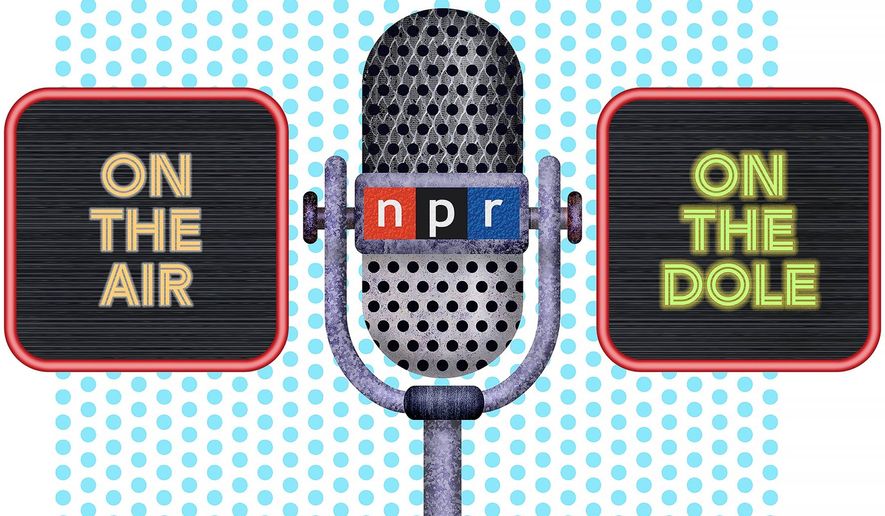OPINION:
In case you missed the feud between National Public Radio and the social media giant Twitter over the last few days, it boils down to this: NPR objects to being described as government-funded, except when Republicans threaten to take away that funding. Then it can’t survive without it.
Last week, Elon Musk’s Twitter slapped a label on NPR’s account, calling it “US state-affiliated media.” On its face, this seemed to be true because NPR receives financial support from the federal government of the United States.
Yet NPR’s president and CEO tweeted a statement claiming that the label was “inaccurate.”
“NPR and our Member stations are supported by millions of listeners who depend on us for the independent, fact-based journalism we provide,” John Lansing said.
To be fair, the “state-affiliated” label is the same one affixed to the Twitter accounts of state-controlled media outlets in Russia and China, and NPR’s objection seemed centered on the fact that they maintain editorial independence from the U.S. government itself.
So, under some public pressure, Mr. Musk changed the label to “government-funded media,” which takes us back to the statement issued by the NPR boss, who did not mention any taxpayer support at all. Needless to say, NPR opposed the revised label as well.
But according to NPR’s own reporting on itself, it certainly does receive taxpayer money. This week, NPR said it takes in less than 1% of its annual budget from the federally funded Corporation for Public Broadcasting.
“It also receives significant programming fees from member stations,” wrote David Folkenflik, NPR’s media correspondent. “Those stations, in turn, receive about 13% of their funds from the CPB and other state and federal government sources.”
So, it’s clear that NPR does indeed receive taxpayer money, both directly from the CPB and from pass-throughs from local NPR member stations, which get a lot of their money from those same taxpayers.
So, how does NPR then explain this further statement from their CEO, who denies the taxpayer funding stream entirely?
“Even if we were government-funded, which we’re not, the point is the independence because all journalism has revenue of some sort,” Mr. Lansing said.
This part — “which we’re not” — is a lie, disproved in the same story that explains NPR’s funding as described above.
Think about that. NPR’s CEO lied to his own reporter, and that reporter printed his quote, knowing that it was a lie.
So, it’s hilarious that NPR announced on Wednesday of this week that it would no longer use Twitter because the platform “demonstrated an interest in undermining our credibility.”
NPR has done a pretty good job of undermining its own credibility, and there have always been plenty of reasons to doubt NPR’s objectivity.
In October 2020, NPR managing editor Terence Samuel explained why NPR was not covering the explosive revelation of Hunter Biden’s laptop computer, which tied his father, now-President Biden, to the family influence-peddling schemes.
“We don’t want to waste our time on stories that are not really stories, and we don’t want to waste the listeners’ and readers’ time on stories that are just pure distractions,” Mr. Samuel said.
Months after that, in April 2021, NPR was forced to issue an epic correction after one of their articles said the laptop had been “discredited by U.S. intelligence.”
The correction read: “A previous version of this story said U.S. intelligence had discredited the laptop story. U.S. intelligence officials have not made a statement to that effect.”
You can almost feel the credibility leaking from here.
The laptop, incidentally, has been repeatedly authenticated by numerous news outlets since the story was initially suppressed by NPR and others in 2020.
It’s no secret that NPR is in the tank for progressives and that audience surveys show its listeners are overwhelmingly Democrats. So, unsurprisingly, there have been plenty of Republican attempts to eliminate the funding that NPR’s CEO now claims they don’t receive. And each time, defenders of government-financed media wail about how crucial the money is to Western civilization, even though they’ll later deny it exists.
When then-President Donald Trump tried to eliminate it, Patricia Harrison, president and CEO of the CPB, warned that “the elimination of federal funding to CPB would at first devastate, and then ultimately destroy public media’s ability to provide early childhood content, life-saving emergency alerts, and public affairs programs.”
How is any of that possible if the federal funding isn’t real or is inconsequential, as they would (sometimes) have us believe?
Because it’s really this simple. They want you to believe that NPR is not taxpayer-funded because they know it hurts their image. But man, do they scream when someone proposes to take that supposedly nonexistent money away.
• Tim Murtaugh is a Washington Times columnist and vice president for communication strategy at National Public Affairs, a political consulting firm.




Please read our comment policy before commenting.